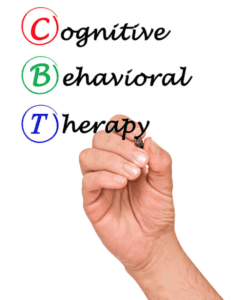

Cognitive behavioral therapy (CBT) is just one type of therapy you may receive at Greene Psychology Group in Raleigh, North Carolina. Also, this therapy works very well for people needing to discover and improve their negative thought patterns. Furthermore, these negative patterns affect everyday life, causing problems in your behavior and emotions.
Basics of Cognitive Behavioral Therapy
Cognitive behavioral therapy helps you change your automatic negative thoughts. Additionally, as said before, this self-programming can make your emotional problems worse. Furthermore, negative thinking contributes to mood, depression, and anxiety. As a result, you may find yourself struggling with one or more conditions like:
- Addiction
- Panic attacks
- Anxiety
- Stress
- Bipolar disorder
- Depression
- Anger
- Eating disorders
- Personality disorders
- Phobias
In CBT with a qualified therapist, you identify your negative thought patterns. You then challenge these and replace your automatic thoughts with more objective and realistic thought patterns. However, cognitive behavioral therapy is so much more than this process. It employs a broad range of strategies like role play, relaxation, mental distraction and journaling to help you achieve your therapy goals.
Types of CBT
Although cognitive behavioral therapy is a type of therapy in and of itself, it also forms a foundation for other therapeutic approaches. These therapies use the foundation and techniques of CBT in specific ways.
Other approaches using CBT include:
- Cognitive therapy
- Dialectical behavior therapy (DBT)
- Multimodal therapy
- Rational emotive behavior therapy (REBT)
Each of these cognitive behavioral therapy techniques use a unique approach but focus on changing the negative thought patterns that feed emotional problems.
Why Cognitive Behavioral Therapy Works
CBT works because your thoughts and feelings help form your behaviors. One example of this negative impact is a phobia. If you think too often or focus intently on airplane accidents, you can develop a fear of flying and limit your life enjoyment based on your phobia.
Cognitive behavioral therapy teaches you to change how interpret your environment and cues from others. Also, by doing so, you can gain better control over your emotions and behaviors. In recent years, these methods have grown very popular.
Reasons why people trust CBT include:
- Awareness of negative thought patterns help improve thinking patterns
- This therapy works very well in short-term treatment
- It works well for treatment of emotional distress that does not require medication
- CBT is proven to help people overcome maladaptive behaviors
- Affordability of the therapy
- It helps people develop lifelong coping skills
Strategies Used in Cognitive Behavioral Therapy
All of us have some faulty beliefs. Also, these beliefs can influence our behaviors and the important aspects of our lives, such as work, school, family and personal relationships. To improve your ways of thinking and affect change in your life, CBT uses multiple strategies. Some of these include:
Identifying Negative Thoughts
You need to understand how your thoughts, feelings and situations shape your behaviors, particularly negative ones. If you struggle with looking deeply inward, this process can prove difficult at first. But you can learn so much more about yourself and how you think to make major changes in your life.
Practicing New Skills
As part of your therapy, you practice new skills that apply to your day-to-day life. Additionally, a good example is that of someone struggling with addiction who practices ways to handle social situations that could trigger relapse.
Setting Goals Using CBT
Setting goals is important for making big improvements in your life and well-being. Also, in your therapy, you learn and practice skills of goal-setting. Also, these goals are SMART, meaning they are specific, measurable, attainable, relevant and time-based. Furthermore, you also learn to not focus just on the results, but the process of achieving your goals.
Solving Problems
By learning to solve problems, you reduce how your life stress affects you. As part of your therapy you use five steps to problem solving. These include:
- Identification of a problem
- Listing potential solutions
- Evaluating these possible solutions
- Choosing which solution to use
- Putting the solution to work
Self-Monitoring
Self-monitoring is also called diary work or journaling. It is a method of keeping up with your behaviors, symptoms, and experiences for discussion with the therapist. Also, this journaling helps you give your therapist the tools they need to provide more effective treatment.
Cognitive behavioral therapy is particularly effective over time. Also, you can soon start seeing improvements in your daily life as you make real behavioral changes.
Cognitive Behavioral Therapy (CBT) in Raleigh, NC
Greene Psychology Group in Raleigh, North Carolina provides cognitive behavioral therapy and a range of other therapeutic methods for treatment of behavioral health problems. Lastly, call us at 919-205-5339 for scheduling today.
